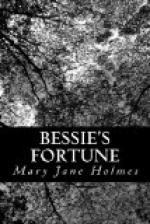“Play high. There’s no such thing as second hand low here. Double your stakes and I’ll be your backer.”
And Daisy played high and won nearly every time, while the lookers-on marveled at her luck and wondered by what strange intuition she knew just where to place her gold. For days the pair known to the crowd as “Les cousines Anglaises,” played side by side, while Lord Hardy maintained his incognito perfectly, though some of the spectators commented on the size of his hands and wondered why he always kept them gloved. And Ted enjoyed it immensely, and thought it the jolliest lark he ever had, and did not care a sous how much he lost if Daisy only won. But at last her star began to wane, and her gold-pieces were swept off rapidly by the remorseless croupier, until fifty pounds went at one stroke, and then Daisy turned pale, and said to her companion:
“Don’t you think we’d better stop? I believe Satan himself is standing behind me with his evil eye! Do look and see who is there!”
“Nobody but your husband, upon my soul,” Ted whispered, after glancing back at Archie, who, with folded arms and a cloud on his brow, stood watching the game and longing to take his wife away. “Nobody but your husband, who looks black as his Satanic majesty. But never you mind, my darlint,” he continued, adopting the dialect of his country. “Play high, and it’s meself’ll make good all you lose. Faith and be jabers they can’t break Ted Hardy.”
Thus reassured, Daisy played high, and her luck returned, and when she left the hall that night she was richer by a thousand pounds than when she entered it.
The next day the McPhersons left Monte Carlo, accompanied by Lord Hardy, who went with them to Genoa, and Turin, and Milan, and the Italian lakes, and Venice, where he said good-by, for he was going to Rome, while they were to turn their faces homeward, stopping for a few weeks at Paris, which Daisy said she must see before shutting herself up at stupid old Stoneleigh, which looked very uninviting to her since she had seen the world and found how much there was to enjoy and how much influence she could exert in it. Others than Ted Hardy had been attracted by the airy little beauty, who always managed to make them serviceable in some way, notwithstanding Archie’s oft-repeated protest that she made too free with strangers, and accepted civilities where she ought to have given rebukes. Archie had not been altogether pleased with the campaign, and was glad when at last he drove into the old park at Stoneleigh and was warmly welcomed by Dorothy and Anthony, who had made the place as comfortable as possible with the small means at their command.




